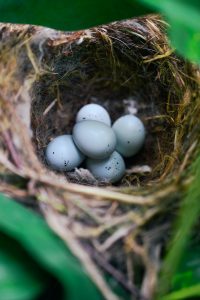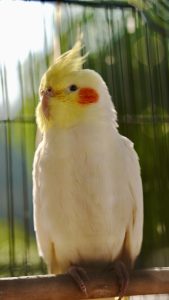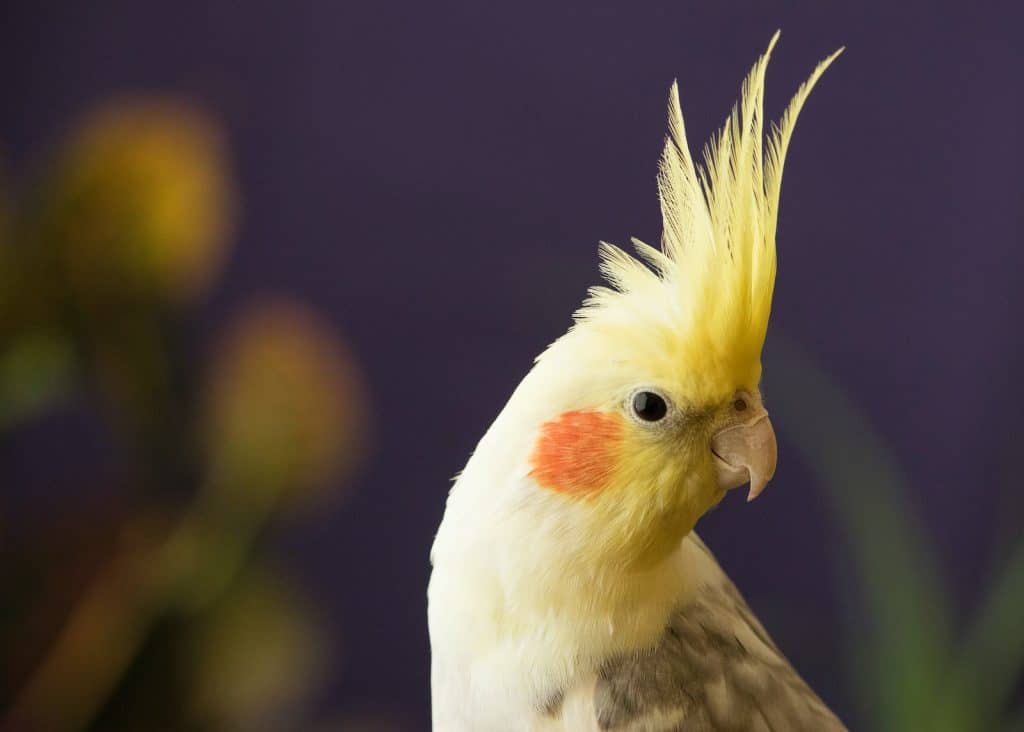If you’re thinking about mating cockatiels, there are a few things to think about. I’ve gathered all of the essential information about cockatiel egg laying and their reproductive cycle below. Let’s get started with one of the most frequently asked question- at what age do cockatiels lay eggs?
Cockatiels are popular pet birds known for their affectionate nature, playful personalities, and attractive appearance. One of the natural behaviors exhibited by female cockatiels is laying eggs. However, the age at which they begin to lay eggs can vary depending on several factors. Generally, cockatiels reach sexual maturity between 6 months to 1 year of age. However, some may not lay eggs until they are 2 years old or even older. It’s essential for bird owners to understand the factors that influence egg-laying in cockatiels, including age, diet, lighting, and nesting conditions, to provide the best care for their birds.
- Enriching the Life of BirdsThis parakeet nesting box adopts combination of natural pine and high-quality transparent acrylic window. Not only makes it easy for us to clear see the state of parrots in the bird breeding box through the acrylic side, but also can observe and record the breeding and hatching process between parrots. In addition, we added a wooden board that is very easy to install and remove, so that the parrot can have a dark environment at night while sleeping.
- Safe and Durable Material Bird nesting box is respectively made of natural pine wood, acrylic window which are warm and cozy, safe, non-toxic, chewable and transparent field of view to ensure healthy breeding for parakeet birds. After you observe the activities of the parrot, if you feel that the bird box is too bright, you can install a small wooden board at any time, so that you will be at ease.
- Easy to use Each bird's nest box includes accessory screws and bird perches to fit completely inside or outside the cage. There is compartment inside the box to protect the bird eggs, and the hinged lid is designed for easy opening and closing of the bird nest box, as well as quick cleaning and changing of bird bedding materials.
- Good Parrot Supplies Pet bird owners have a common hobby, that is to keep looking for good quality pet supplies for their little animals. This parakeet nesting box is a practical house for breed, rest, sleep, relax and play. Its also a good gift for your lovely parrots.
At what age do cockatiels lay eggs?
Cockatiels lay one to two clutches of eggs each year. Female cockatiel deposit around one egg every 48 hours until they have a full clutch. Each clutch usually contains between two and eight eggs. The incubation period varies, but it typically lasts about 20 days starting when the hen begins to incubate.
Keep in mind that incubation periods can vary, and that the eggs may hatch one after another. Because a hen lays her eggs 48 hours apart, she may not begin to incubate them until there are a few in the nest. Expect the eggs to hatch over days if she sits on them before they’re all laid.
How do I care for mating cockatiels?
The breeding process is incredibly taxing for birds, so it’s integral that we take care of them to raise the likelihood of healthy eggs and fledglings. Domestic cockatiels can breed year-round if their environment permits it, whereas wild cockatiels typically breeds during spring or summer.
Ensure your birds have access to increased natural light and longer days, even if you must use indoor lighting. Keep their environment warm and moist. A mating pair needs a large cage that includes a nesting box and enough room for exercise.
Provide your pets with toys and a variety of foods to keep them stimulated.
Mating pairs especially will appreciate softer foods, as this is what they would feed babies.
Females that are nesting likely won’t want to leave their nesting box for food or water.
Keep everything she needs close by so that she can continue to receive enough nutrition during this trying time.
Make sure her diet includes adequate amounts of calcium. In producing eggs, hens lose a substantial amount of calcium. Leafy green vegetables, sweet potatoes, and regular pellets are all excellent sources of calcium for mating cockatiels. Make sure they have access to plenty of water as well as full spectrum or natural light if possible.

How many clutches is it healthy for a cockatiel to have?
Cockatiels typically lay one or two clutches of eggs each year. It is typical for cockatiels to produce 1-2 clutches of eggs in a year’s time. Because owners can modify the conditions in which they live, it is possible for your cockatiel to lay 3-4 clutches in captivity.
Although it is possible to have more than two clutches in a year, many experts discourage this practice. Cockatiels can survive with one-two clutches per year to keep them healthy and happy.
Remember, laying eggs and nesting is a lot of hard work, especially for the hens! Cockatiels that lay too many eggs can lead to a slew of health issues including calcium shortages that cause brittle bones, malnutrition, weight loss, and even seizures. It can also induce excessive stress and mental disorders.
Having fewer breeding pairs will result in healthier offspring. A parent’s good health is crucial for their baby’s development. Although you might want your birds to have no more than 2 broods, they could lay more eggs.
In captivity, birds are generally given more controlled and safe environments, which encourage breeding behavior. You’ll need to make some modifications in the environment if your birds keep laying eggs. This should discourage mating and give your female cockatiels a break.
Merely moving the pair from one cage to another is insufficient, since this exposes them to new stressors. This entails shortening light exposure, removing nesting boxes and nesting materials, and even keeping the pair in separate cages. The greater the environmental change, the better, as it will assist break their hormonal cycles.
- STURDY CONSTRUCTION - Our bird cage is made of the highest-quality metal frame which has been tested to ensure durability; Coated with exquisitely nontoxic hammer-pattern paint, which is corrosion-resistant, it not only ensures beauty but also a healthy and safe living environment for birds
- MULTIPLE FUNCTIONS - The design with a flat top gives you more free space to hang bird toys or put some potted plants to decorate the appearance of your cage, increasing the enjoyment of the bird cage; Different decorations and useful equipment can be hung on either side of the cage or put on the mesh shelf
- CONSIDERATE DESIGN - With the design of the considerate 4 universal casters, you can put the cage where you want and it will not run anywhere; The unique latch design is firm and safe, which can prevent the bird from opening the door by themselves and ensure the protection; The perch is designed to fit the size of a bird's feet and the breeding box can be hung on either side of the cage
- EASY TO CLEAN - Designed with the drawer style tray, all you need to do is to slide out the bottom tray and wash it off, which is easier to observe and clean for you; Additionally, all of the shelves can be easily removed for easy cleaning; Keep a clean and tidy environment and keep your pets safe
- ABUNDANT ACCESSORIES - In addition to the high-quality steel frame bird cage, we also provide you with 4 plastic transparent food boxes, 2 wooden perches, and a tray in the cage; Different food boxes can feed different nutritious food to birds, which is conducive to the better reproduction and growth of diverse birds
What if my cockatiel is not sitting on her eggs?

To begin with, keep in mind that your hen may not sit on all of her eggs until they’re all laid. If she lays an egg or two but does not start to sit on them, don’t be alarmed. She might be waiting for the right time to start incubating, so give her a few days and check back if she doesn’t lay any more.
Cockatiels are notorious for sitting on their eggs, especially if they are young hens with little expertise or agitated. A hen that can lay eggs does not necessarily have the maturity to raise youngsters yet. Even though viable eggs may be avoided by a sick or unsafe cockatiel,
If your bird isn’t sitting on viable eggs, you may take them out and incubate them yourself. It’s still possible to get healthy chicks despite the fact that the eggs aren’t fertilized. Another frequent reason is that weren’t even fertilized eggs.
If the eggs are being ignored or pushed out of the nest box, then it is time to get rid of them as they will never hatch.
- Natural snack made with limited number of whole ingredients
- No added sugars, fillers, or artificial preservatives
- Includes dried papaya, pineapple, bell pepper, black currant, and sliced almond
- Blend designed for small pet birds
- For Parakeets, Cockatiels, Lovebirds, and Small Conures
- Natural snack made with limited number of whole ingredients No added sugars, fillers, or artificial preservatives Includes dried papaya, pineapple, bell pepper, black currant, and sliced almond Blend designed for small pet birds
When do cockatiels start and stop laying eggs?
Cockatiels typically reach puberty between the ages of 5 and 6 months old. This is when they may start to show physical manifestations of sex. They will not achieve sexual maturity until 9-12 months old, however. One year is a good line in the sand for sexual maturation, with many experts suggesting waiting till they are 18 months old to breed them.
Cockatiels and wild birds can breed at any age. When they are ready to mate and lay eggs, they hide from each other in separate cages. They can safely mate and produce eggs if they remain healthy and don’t have too many clutches per year. Given their long lifespan, this is somewhat early.
Cockatiels can live up to 20 years in captivity if cared for properly. Once you have healthy cockatiel eggs, it’s time to think about rearing the baby pet birds! Egg laying is just the beginning of your exciting adventure into cockatiel reproduction.
If you take good care of your mated pair and their eggs, you should be able to expect healthy fledglings shortly.
Note: Egg-laying late in life can create certain health dangers. Chronic egg laying is also potentially dangerous to your cockatiel.
- EASY TO USEEasily hooks on to cage for convenient use.
- MATERIALAdopting the natural calcium stone, non-toxic and no harmless.
- SAFE AND HEALTHYCompletely safe to chew and promotes clean and healthy teeth.
- FUN TO REST AND GRINDCan be arbitrarily placed in cages, your little pets will gnaw by themselves.
- COLORFUL DESIGNVibrant colors can better attract the attention of birds, prevent parrots from getting depressed and yelling or biting.
How long do cockatiel eggs take to hatch?
Cockatiel eggs typically take about 18-21 days to hatch after being laid. However, this can vary slightly depending on factors such as the temperature and humidity levels in the nesting area, as well as the age and health of the parent birds. During the incubation period, it’s crucial to ensure that the eggs are kept in a warm, stable environment and that the parent birds have access to a balanced diet and plenty of fresh water. Once the eggs hatch, the chicks will require frequent feeding and care from their parents for several weeks until they are ready to leave the nest and begin exploring their surroundings.
For an interesting take on health, read about the effects of sweets in Chocolate and Dental Health. Finally, understand common cockatiel behaviors with Why Does a Cockatiel Stand on One Leg?. Each of these articles is packed with valuable information to help ensure your cockatiel’s health and happiness.







